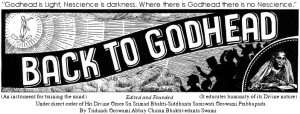SB 8.8.19-While walking among the Gandharvas, Yakṣas, asuras, Siddhas, Cāraṇas and denizens of heaven, Lakṣmīdevī, the goddess of fortune, was scrutinizingly examining them, but she could not find anyone naturally endowed with all good qualities. None of them was devoid of faults, and therefore she could not take shelter of any of them.
SB 8.8.20-The goddess of fortune, examining the assembly, thought in this way: Someone who has undergone great austerity has not yet conquered anger. Someone possesses knowledge, but he has not conquered material desires. Someone is a very great personality, but he cannot conquer lusty desires. Even a great personality depends on something else. How, then, can he be the supreme controller?
PURPORT-Here is an attempt to find the supreme controller, or īśvara. Everyone may be accepted as an īśvara, or controller, but still such controllers are controlled by others. For example, one may have undergone severe austerities but still be under the control of anger. By a scrutinizing analysis, we find that everyone is controlled by something else. No one, therefore, can be the true controller but the Supreme Personality of Godhead, Kṛṣṇa. This is supported by the śāstras. Īśvaraḥ paramaḥ kṛṣṇaḥ: [Bs. 5.1] the supreme controller is Kṛṣṇa. Kṛṣṇa is never controlled by anyone, for He is the controller of everyone (sarva-kāraṇa-kāraṇam [Bs. 5.1]).
SB 8.8.21-Someone may possess full knowledge of religion but still not be kind to all living entities. In someone, whether human or demigod, there may be renunciation, but that is not the cause of liberation. Someone may possess great power and yet be unable to check the power of eternal time. Someone else may have renounced attachment to the material world, yet he cannot compare to the Supreme Personality of Godhead. Therefore, no one is completely freed from the influence of the material modes of nature.
PURPORT-The statement dharmaḥ kvacit tatra na bhūta-sauhṛdam is very important in this verse. We actually see that there are many Hindus, Muslims, Christians, Buddhists and religionists of other cults who adhere to their religious principles very nicely but are not equal to all living entities. Indeed, although they profess to be very religious, they kill poor animals. Such religion has no meaning. Śrīmad-Bhāgavatam (1.2.8) says:
dharmaḥ svanuṣṭhitaḥ puṁsāṁ viṣvaksena-kathāsu yaḥ notpādayed yadi ratiṁ
śrama eva hi kevalam One may be very expert in following the religious principles of his own sect, but if he has no tendency to love the Supreme Personality of Godhead, his observance of religious principles is simply a waste of time. One must develop a sense of loving Vāsudeva (vāsudevaḥ sarvam iti sa mahātmā sudurlabhaḥ [Bg. 7.19]). The sign of a devotee is that he is a friend to everyone (suhṛdaṁ sarva-bhūtānām). A devotee will never allow a poor animal to be killed in the name of religion. This is the difference between a superficially religious person and a devotee of the Supreme Personality of Godhead.
SB 8.8.25 purport….In other words, since the goddess of fortune stays on the bosom of Nārāyaṇa, she naturally sees any devotee who worships Nārāyaṇa. When the goddess of fortune understands that a devotee is in favor of devotional service to Nārāyaṇa, she is naturally inclined to bless the devotee with all opulences. The karmīs try to receive the favor and mercy of Lakṣmī, but because they are not devotees of Nārāyaṇa, their opulence is flickering. The opulence of devotees who are attached to the service of Nārāyaṇa is not like the opulence of karmīs. The opulence of devotees is as permanent as the opulence of Nārāyaṇa Himself.
Some Conclusions–The above sequence is a nice analysis of Sri Laxsmi the Goddess of Fortune, and how she was trying to find her “mate” among the great leaders of this universe, none of whom could meet her criteria. We can see from her understanding, that even though one may be highly situated in austerity, power, knowledge, control of the senses,etc, none of these great souls as was described,were free of the material modes of nature. When I read these descriptions, it makes me humbled to realize how great a pure devotee must be before he can take on the karma of thousands of disciples. or when a conditioned soul tries to “imitate” the status of an actual mahatma Maha Bhagavata devotee of the Lord, it is simply a ludicrous affair of imitation just like the King Paundraka who tried to imitate Krsna’s dress and weapons, yet every sane person (not Paundrakas followers) could see he was nothing but a very cheap knockoff of Lord Vishnu !!
Hare Krsna
damaghosa das


